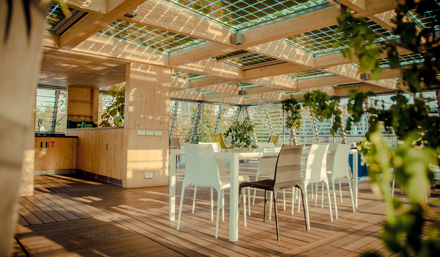Nowadays, “smart home” technologies have developed and blossomed and a large number of applications have been explored in areas as diverse as safety, homecare, energy management, domestic comfort, leisure and so forth. Grenoble possesses a wealth of expertise to rise to the “well-being in the digital era” challenge and as such the Amiqual4Home project was inaugurated in October 2013.

Amiqual4Home is an open platform that seeks to catalyse research and innovation in smart software and systems in the Grenoble – Ise?re region by inventing, refining and experimenting new technologies to improve the quality of daily life.
The goal of Equipex Amiqual4home is to connect digital services together and enhance day-to-day objects by granting them perception, action, interaction and communication skills to serve the needs of citizens. The project has received funding for a period of eight years as part of the future investments sponsored by the National Research Agency. The project will see a gradual development of quick prototyping workshops and living labs where personal services and objects will be manufactured, validated and refined.
Monitoring energy expenditure
The former Ensimag building in Montbonnot will be the first of these living labs. It will be reorganised and redesigned in partnership with GSCOP, G2ELab and Schneider Electric. Both GSCOP and G2ELab will help to transform the energy control system and the instrumentation in the building. The researchers involved in the Smart Energy project led by Grenoble INP and which is aimed at helping consumers to have a better idea of and more easily assess their energy expenditure, also helped to fit out the building. “Sensors will be strategically placed so as to continually obtain measurements of the energy expenditures. These measurements will be so accurate that it will be possible to determine at any time the number of people working in an office, whether the windows are open or not, and so forth.”
“The goal is to be able to characterise energy expenditure related to the efficiency and use of the building and to suggest energy management strategies, explains Stéphane Ploix, researcher at GSCOP. Interactive systems that will enable the dialogue between the occupant and the system are currently being developed and should improve these energy management strategies.”

Amiqual4Home is an open platform that seeks to catalyse research and innovation in smart software and systems in the Grenoble – Ise?re region by inventing, refining and experimenting new technologies to improve the quality of daily life.
The goal of Equipex Amiqual4home is to connect digital services together and enhance day-to-day objects by granting them perception, action, interaction and communication skills to serve the needs of citizens. The project has received funding for a period of eight years as part of the future investments sponsored by the National Research Agency. The project will see a gradual development of quick prototyping workshops and living labs where personal services and objects will be manufactured, validated and refined.
Monitoring energy expenditure
The former Ensimag building in Montbonnot will be the first of these living labs. It will be reorganised and redesigned in partnership with GSCOP, G2ELab and Schneider Electric. Both GSCOP and G2ELab will help to transform the energy control system and the instrumentation in the building. The researchers involved in the Smart Energy project led by Grenoble INP and which is aimed at helping consumers to have a better idea of and more easily assess their energy expenditure, also helped to fit out the building. “Sensors will be strategically placed so as to continually obtain measurements of the energy expenditures. These measurements will be so accurate that it will be possible to determine at any time the number of people working in an office, whether the windows are open or not, and so forth.”
“The goal is to be able to characterise energy expenditure related to the efficiency and use of the building and to suggest energy management strategies, explains Stéphane Ploix, researcher at GSCOP. Interactive systems that will enable the dialogue between the occupant and the system are currently being developed and should improve these energy management strategies.”





